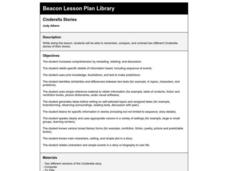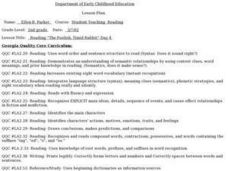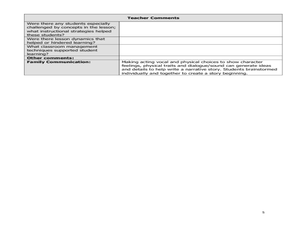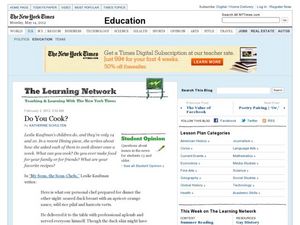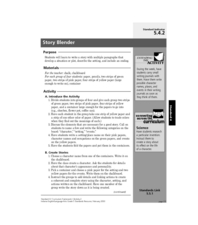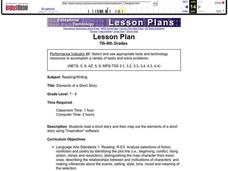Curated OER
Cinderella Stories
Students read and compare Cinderella stories using a worksheet. They write and illustrate original tales with a twist.
Curated OER
How Can We Write A Story Using Dr. Seuss' Writing and Illustration Style?
Young scholars write a story. In this writing style and illustration lesson, students review elements of Dr. Seuss' writing and illustration style and read a few more books written by him, examining the writing style. Young...
Curated OER
Farm Stories, Animal Webbing, Favorite Farm Animal Graph
Students brainstorm animals they would expect to see on a farm. They save these on a Kidspiration web. Students watch or read a farm story. They discuss the characters. Students vote for their favorite farm animal and crate a graph using...
Curated OER
Language Arts: Plotting Stories
Second graders read the story, "The Foolish, Timid Rabbit," as part of a unit on appearances. After reading with partners, they write their own stories that include elements about some forms of matter from their science studies. Students...
Curated OER
An Upbeat West Side Story: Puerto Ricans and Postwar Racial Politics in Chicago
Tenth graders read an article about the migration of Puerto Ricans to Chicago. As a class, they identify the barriers the immigrants faced regarding employment and separation from family members. To end the lesson, they work with a...
Curated OER
Acting as a Pre-write Tool
Second graders use acting to help them in a prewriting activity to develop a story. In this prewriting lesson plan, 2nd graders form a character map and brainstorm ideas for their story.
Curated OER
Character Traits
Sixth graders explore details from a story to develop ideas and opinions about character traits. Using a Smart Board, 6th graders create a chart explaining the character's action and traits. In groups, students discuss and describe...
Curated OER
Using Story Structure to Enhance Comprehension
In these story structure worksheets, learners review story structure and learn how to use story maps to help with their reading comprehension. Students review an example story map and then study three different graphic organizer versions...
Curated OER
Parasite Development and Life Cycle
If you are new to teaching agriculture classes, this outline may be helpful when you are preparing a lecture on parasites in livestock. In addition to lecturing on this topic, the lesson plan suggests that learners research the life...
Curated OER
Children Cooking at Home: Developing Opinions
Excerpts from a New York Times article about children cooking dinner for their family can lead learners to express opinions about taking on real life responsibilities. The story will prompt discussion, but add more questions directed at...
PBS
Stories of Painkiller Addiction: Learning About Opioids
Feeling high is not the only side effect of abusing prescription opioids. Middle and high schoolers learn more about specific painkillers, including Fentanyl, Oxycodone, and Clonazepam, as well as their common brand names and extensive...
Core Knowledge Foundation
Fairy Tales and Tall Tales Tell It Again!™ Read-Aloud Anthology
Enrich a unit on fairy tales and tall tales with a set of read-aloud lessons. Second graders hone writing, vocabulary, comprehension, and literary analysis skills as they read classic stories. Complete with extension projects, discussion...
Curated OER
Learning to Summarize a Story
Young scholars with hearing loss read independently and understand what is being read to them. In this independent reading lesson plan, students sequence and discuss the book that is read.
Curated OER
Reading Stories in Art
Students study how artists tell stories using visual images by identifying and comparing elements of narrative (setting, characters, and plot) in a painting and a Greek vase.
Curated OER
Classic Short Stories- Locked Room Settings
Students read the short story "The Problem of Cell 13" and examine the plot devices that build suspense. In this lesson students create their own short story using the same locked room setting.
Curated OER
Teaching Language Arts in Kindergarten Using Stories, Aesop's Fables, and Tall Tales
Students search into a variety of story elements in the eight lessons of this unit. The title, author, illustrator, setting, main character, problem, solution, events and the story are the components of the lessons.
Curated OER
Writing a Mystery Story
Students examine the elements of mystery stories and read Rage in Harlem. In reciprocal teaching groups, they discuss the author's development of the story, and complete dialectical journals.
Curated OER
Creating a Short Story
Students examine how to outline their story, to write a story and then edit their work. They illustrate their story using drawing features like squares, circles, and other shapes or a drawing program if they have it on the computer.
Curated OER
My Favorite Story
Students share their pictures on an online database. As a class, they discuss their favorite books and why they like it. They review the elements of a story and brainstorm ideas for each category. To end the lesson, they complete a...
Curated OER
Story Blender
Fifth graders write a story with many paragraphs that include a plot, setting, and ending. In this writing lesson plan, 5th graders create stories as a class.
Curated OER
Combining Geography and Literature by Mapping a Story
Students listen to or read a story on their own. Using the text, they describe the relative locations of the main events. In groups, they develop two and three dimensional maps of the story. They create a key and a title for their map.
Curated OER
Elements of a Short Story
Students read a short story and then map out the elements of a short story using "Inspiration" software. They read 'Tell-Tale Heart' by Edgar Allen Poe.
Curated OER
Elements of a Short Story
Students read a short story, The Tell-Tale Heart and create a story map identifying the elements of a short story included in the selection. Students complete an Accelerated Reader test on the selection.
Curated OER
Authoring Stories for Guided Reading
Students in a teacher education program write their own children's book. Using books already written, they review age appropriate for their grade level placement. They write their own story and illustrate it using various software...
